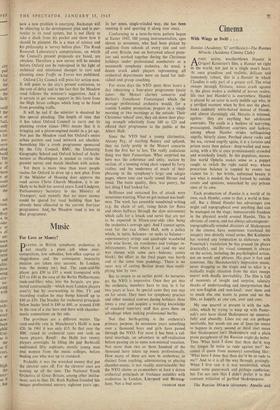Music
For Love or Money? FILAYING in British symphony orchestras is r not exactly a plum job when over- competition, low subsidies, box-office caprice or sluggishness and the consequent insecurity malaise are taken into account. In London, true, the money isn't bad. The rank-and-file player gets £30 to £35 a week (compared with £35 to £40 in the case of the Berlin Philharmonic rank-and-filers who, into the bargain, are pro- tected contractually—which most London players aren't); but by overworking in film, TV and recording studios he may bump himself up to £40 or £50. The bracket for orchestral principals below leader level is £40 to £60, or around £100 in the case of a star here and there with chamber- music connections on the side.
The provinces are a different matter. The rank-and-file rate in Manchester's Hall6 is now £20. In 1961 it was only £15. In that year the BBC raised its orchestral rates and took on more players. Result: the Hand lost twenty players overnight. In filling the gap Barbirolli auditioned fifty aspirants, mostly young men and women from the music colleges, before finding one who was up to standard.
Probably it was the wretched money that put the cleverer ones off. For the cleverer ones are coming up all the time. The National Youth Orchestra of Great Britain, among other institu- tions, sees to that. Dr. Ruth Railton founded this unique professional nursery eighteen years ago.
In her tense, single-minded way, she has been running it and spurring it along ever since.
Conforming to a term-by-term pattern begun at Easter 1947, 160 young instrumentalists, ages eleven to seventeen, who had been picked by audition from schools of every size and sort all over Britain, met on borrowed school prem- ises and worked together during the Christmas holidays under professional conductors as a mammoth symphony orchestra. As usual, a dozen crack adult players representing all orchestral departments were on hand for indi- vidual and group coaching.
For seven days the NYO spent three hours a day rehearsing a four-piece programme (main items: the Mozart clarinet concerto and Berlioz's Symphonic Fantastique) which the average professional orchestra would, for a routine London promotion, prepare in a single morning or two mornings at the outside. Their Christmas 'school' over, they cut down their play- ing strength selectively from 160 to 125 and offered their programme to the public at the Albert Hall.
Since the NYO hdd a young clarinettist, Antony Pay, of startling fluency and aplomb, they sat fairly pretty in the Mozart concerto from the first bar to last. The really audacious thing was their Fantastique. What surprised me here was the coherence and unity, section by section, of a teeming string choir topped by forty violins; and the tenderness of much of their phrasing in the symphony's largo and adagio pages, where tone can easily sound fibrous and timid. The main quality, then, was poetry, the last thing I had looked for.
Brilliance and sustained fire of attack were sometimes wanting. What we got instead was beefi- ness. The work has ensemble woodwind writing (e.g. the chain of soft, rising thirds for flutes and oboes halfway through the slow movement) which calls for a knack and nerve that are not to be expected in fifteen-year-olds (this being the orchestra's average age). And I cannot 'agree, even for the vast Albert Hall, with a policy which, in tuttis, balances—or seeks to balance— supernumerary strings and quadruple woodwind with nine horns, six trombones and truibpet re- inforcements. From where I sat (and my seat was chosen with some care—balcony, centre block), the effect in the final pages was harsh and at the same time puddingy. There is no surer way of cutting Berlioz down than multi- plying him by two.
But to return to an earlier point. As nurseries go, the NYO is impressive. Once they get into the orchestra, members have to stay in it for two years at least. In special cases they can stay on for seven. They meet for symphony practice and other musical courses during holidays three times a year and acquire a working knowledge of standard repertory stuff that gives them an advantage when seeking professional berths.
Not that berth-getting is the orchestra's primary purpose. In seventeen years something over a thousand boys and girls have passed through the NYO. For most it has been a cul- tural interlude, an adventure in self-realisation before passing on to some non-musical vocation. Not more than two or three hundred of the thousand have taken up music professionally. How many of these are now in orchestras, as distinct from teaching, administering or playing chamber-music, is not readily ascertainable; but the NYO claims as ex-members at least a dozen orchestral principals or freelance notables with orchestras in London, Liverpool and Birming-






























 Previous page
Previous page